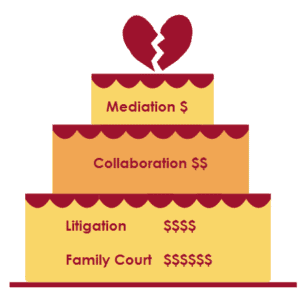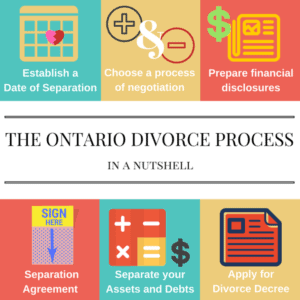

Family Mediation - Divorce Mediation
Work Together - Do It Right - Follow a Plan
What are the Benefits of Family Mediation?
Thinking of Divorce? First Things First
How much a divorce will cost, how acrimonious it will be, and what the future looks like, is decided by you… right now – before your first move.
STOP - BREATHE - THINK
Before anything, do your homework. Know your gameplan.
ASK YOUR SELF THESE 10 QUESTIONS:
- Am I ready to make a decision – be it to stay or to leave?
- Is now the best time to separate?
- If I decide to stay, what are the financial, emotional or safety risks?
- What do I have to do to create a smart financial plan for myself (and my children?)
- Do I understand how Ontario Law divides our stuff; both our assets and our debts?
- Do I actually know what’s involved with Child or Spousal Support?
- Does it make sense to try and keep my home or can I make a wiser money plan?
- If my spouse is “difficult,” do I have a solid strategy on how to navigate through this?
- Can I articulate my negotiation options and then choose the wisest legal process for my situation?
- What can I do now to land on the best foot forward for myself (and my children?)
BEFORE YOU HIRE A LAWYER, MEDIATOR, OR GO TO COURT
Gain Confidence, Clarity and a Strategic Plan
Discover Your Next Steps
For ONLY $399
Feeling lost in the maze of separation? Our 90-minute Divorce Discovery Zoom Session cuts through the confusion and will help you make a decision, make a plan and understand your first steps.
SOLO
Solo Discovery Session
$399
For individuals who have not yet made a decision or need to equip themselves with the right information. The SOLO Discovery Session will answer your questions, explain Ontario Law in simple English and give you the information you need to make your next decisions.
- Guidance before the talk with your spouse
- Understand your rights & options
- Learn how to start the conversation
JOINT
Joint Discovery Session
$399
For couples seeking a legally smart and financially-savvy divorce. Addressing misconceptions and understanding options together is invaluable. The JOINT Discovery Session will align you and your spouse with facts—not opinions— the first step towards a smarter separation.
- Minimize miscommunication
- Address misconceptions together
- Get on the same financial and legal page
CHOOSE WISDOM
Whether attending solo or jointly as a couple, keep your separation straight-forward, amicable and cost effective.
Get straight talk about the legal and financial realities of divorce in Ontario.
It’s the information you need to make informed decisions.
Move Your Life Forward With WISDOM
Schedule Your Discovery Session Now
1-866-748-6363
Mediation FAQ - Table of Contents
Why You Should Consider Divorce Mediation: Cutting Through the B.S.
Alright, folks, let’s talk about divorce mediation. Yes, it’s about as much fun as budgeting for groceries or figuring out your taxes, but just like those, it’s necessary if you want to get through the muck without losing your shirt or your sanity. Divorce doesn’t have to be a war. There’s a way to untangle your lives without handing over your life savings to lawyers. It’s called mediation, and here’s the skinny on it.
What the Heck is Family Mediation Anyway?
Imagine you and your soon-to-be ex can sit down with a referee of sorts, but instead of deciding who gets a penalty, they’re helping you hash out who gets the sofa, who takes the cat, and how you’re going to handle the kids’ college fund. That’s mediation.
It’s a smart, legal process where you both decide the terms of your divorce with the help of a neutral third party. No judges, no courts, just you, your ex, and a mediator trying to keep things civil.
Why Would You Even Consider Mediation?
It Saves You Money: Think of mediation as the discount aisle of divorces. You’re not paying two lawyers to battle it out; you’re investing in a mediator to help you find a middle ground. Less money on legal fees means more money for your new start.
It’s Quicker: Unlike the court system, where you could be waiting for Godot to call your case, mediation can be wrapped up in a fraction of the time. More time to move on with your life.
You Have Control: Instead of a judge dictating who gets what, you and your ex get to make the decisions. It’s like being the CEO of your divorce. Power to the people, right?
Less Stressful: Divorce is up there with moving house or finding a parking spot at the mall on Boxing Day in terms of stress. Mediation can reduce that stress by promoting a cooperative, rather than a combative, environment.
The Bottom Line On Mediation?
Divorce mediation isn’t a magic wand, but it’s a tool that can save you time, money, and a boatload of stress. It’s about finding a way to move forward without being enemies. Remember, it’s not just about ending a marriage; it’s about starting a new chapter. And who doesn’t love a fresh start?
So there you have it. Divorce mediation in a nutshell. Remember, it’s always wise to talk to a professional to see if it’s the right fit for your situation. And hey, keep your chin up. This too shall pass.
What Do I Need To Know About Family Mediation?
How do I know which legal process is best for my family ?
Avoid costly mistakes—know your rights and responsibilities in Ontario. Move forward with a solid plan! Answer a few quick questions and instantly receive your FREE Ontario Divorce Plan specific to your situation.
Start now and take control of your future!
Why Should I Choose Divorce Mediation?
Family Mediation is an alternative to the traditional lawyer-led litigation process. In family mediation, a specially trained professional, known as a mediator, helps you and your ex negotiate all of your family issues such as dividing up your stuff, support, the children, the family home, and coming to a mediation agreement.
The mediator’s job is to remain neutral and help both of you negotiate yourselves. In order to participate in mediation, you and your ex must agree to not “lawyer up” but instead engage with a family mediator together. You and your ex must go into the family mediation process voluntarily and both of you will maintain control over how the agreement is made.
The process is designed to ensure a safe environment and level playing field during the negotiation process.
Family Mediation is About Control


BE SHREWD
AVOID A MESSY DIVORCE
CONSIDER MEDIATION – Before Lawyer Litigation
STAY OUT – Of The Family Courts
CREATE & PLAN – Your Financial Strategy
DO YOUR HOMEWORK – Understand How Divorce Works in Ontario
Family Mediation Means No Lawyers, Right?
Well, yes… and no. One of the benefits of family mediation is that it allows you and your spouse to choose if and how much you want to involve lawyers.
Though you are ALWAYS advised to receive independent legal advice from a lawyer before you sign any agreement, this does not mean that you need to pay lawyers to be involved in the negotiations themselves.
Mediated negotiations allows you to involve lawyers minimally (for instance as independent legal advice), or if necessary, as part of the mediation process itself, such as when your file is either more complicated or more acrimonious.

The Common Sense Divorce is NOT just for couples that are amicable and get along. In fact for couples that are angry or acrimonious, but who are willing to communicate, often mediation brings much better and more cost-effective results than litigation.
-Gail Vaz-Oxlade Tweet

Family Mediation
Myths
In Ontario, using a family mediator as your divorce process is quickly becoming the preferred way for people to create their Separation Agreement or Divorce Agreement.
Still, there are a lot of misunderstandings about family mediation and what it means to engage a divorce mediator instead of retaining the traditional litigation lawyers. Here are the most common fears and common concerns that can prevent you from taking the wise approach towards creating your Separation Agreement.
Are Mediated Separation Agreements Legally Enforceable?
The mediation process is not only accepted by the courts in Ontario, it is now highly favoured and encouraged by the court system. A Separation Agreement reached using a divorce mediator and a proper legal process is considered not only legal but also binding and enforceable.
Does Mediation Mean the Weaker Spouse Won’t be Protected?
In most marriages, there are always the dominant personalities and the less dominant personalities and often there is a concern that the less dominated personality will be overshadowed. This concern often comes up most by women married to strong personalities.
The underlying belief and assumption is that without an aggressive litigation lawyer by their side, they won’t have a voice during negotiations.
In reality, divorce mediators are trained to ensure that all voices are heard and that one spouse is not allowed to steal the microphone. More interesting is that studies are indicating that family mediation can be notably beneficial for families that have histories involving domestic violence.
This is likely because both spouses must meet together with their divorce mediator and this causes individuals to remain accountable for their actions and thus behave better during the separation process.
Is Family Mediation for People With A Lot of Assets or Complicated Businesses?
Financial mediation… this is our specialty! Family mediation could work in almost every divorce situation and even more so with regards to finances. Our team of divorce mediators work hand in hand with specialized financial mediators called certified divorce financial analysts (CDFA) who are specially trained to work with any type of financial asset.
Remember for most people, their divorce agreement is more about finances, retirement planning and tax implications.
Doesn't Family Mediation Only Work if You Already Agree on Most Things?
The whole point of family mediation is to solve issues and problems you don’t agree on. Our family mediation process will help each of you negotiate, find compromises and generate solutions even if you believe you don’t have any.
You don’t need to agree on the issues. You just need to agree to try and keep it more amicable, agree to mediate and agree to start.
Does the Divorce Mediator Make All the Decisions?
In your mediated negotiations, you and your spouse make all of the decisions. A divorce mediator will make sure you ask all the right questions, and will help you find solutions. You’re responsible for agreeing to outcomes that work best for each of you.
Does Mediation Take A Long time?
You’re saying this because you really don’t understand the alternatives in Ontario. Compared to a divorce lawyer or collaborative law, mediation will almost certainly be faster… weeks compared to months or years!
There is NO comparison to the time and money that it will take to go through a contested court proceeding.
But Isn't Family Mediation Touchy-Feely?
Your divorce mediator is not your therapist. The goal in mediation is not to talk through your problems, but rather find solutions and generate a negotiation.
It’s not therapy. It can be helpful to talk about the emotions or reasons behind them to resolve certain difficult issues, but the goal is to tackle problems and find a solution that works for everyone. From there, your divorce mediator will help you draft a Separation Agreement that will be enforceable in court.
If We Mediate Do We Still Need Lawyers?
Lawyers are still involved, but only in a limited way. Typically at the end of the mediation process, and typically only to provide independent legal advice (ILA).
This means that lawyers are not negotiating on your behalf, but rather making sure that you and your spouse understand what you are signing and that you understand your rights, responsibilities and obligations. Mediation allows you to decide how much you want lawyers involved.
Are Men at a Disadvantage in Family Mediation, if the Mediator is Female?
Mediation is blindfolded to your gender. The process makes great efforts to not be skewed. Our divorce mediators will ensure that both parties have a voice, an opportunity to speak and the tools to self-negotiate.
To make sure your interests are addressed, when you complete your mediation, you will be assigned a family lawyer who will review your Agreement on your behalf.
Mediation Doesn’t Work Unless You Have Good Communication With Your Ex.
Most people are facing divorce because they don’t have good communication, so this is definitely not a requirement for mediation.
Now we offer different kinds of mediation to help people even more… mediation for couples without children, mediation with a financial emphasis and even mediation for couples that need their lawyer to join them in mediation room. The Common Sense Divorce is built to assist the parties in coming to an agreement.
SMART
Question #1
What is your greatest concern about Divorce?
Does My Spouse Have To Be Willing To Participate In Family Mediation?
The quick answer is yes. The whole point of mediation is that you and your spouse work together in order to negotiate your Separation Agreement.
This means that you will have to be in the same room and you will have to communicate with each other. Saying this, there are resources that can help you to deal with bringing your spouse to the negotiation table and to assist couples that have difficulty communicating.
Will Mediation Still Work If My Spouse and I Are Volatile?
Sometimes couples need extra assistance negotiating their separation agreement and want the assistance of a family lawyer who will work with them still within the context of family mediation. This process is called Collaborative Mediation.
Collaborative mediation is exactly the same as regular mediation. You and your spouse work with your family mediator, but because of complexities or conflicts, you each have your own specially trained collaborative lawyer with you to assist in your negotiations.
Collaborative mediation is obviously more expensive than regular mediation, but typically less expensive than traditional litigation, as you and your spouse work as a team to negotiate together out of court.

Isn't a Family Mediator the same as a Marriage Counselor?
Mediators and relationship counsellors both use conflict resolution tools to help their clients, but the Family Mediator’s sole focus is to help you reach an agreement with your spouse on issues pertaining to your separation.
A Family Mediator is not hired to save your marriage relationship, but they are skilled at helping you maintain a healthy post-marriage relationship.


The Cost of Your Divorce...
will be a combination of the following factors
1. The level of acrimony and hostility between you and your spouse.
2. Your willingness to work together.
3. The Legal Processes you both choose.
4. The amount and complexity of your financial and property issues.
5. The extent that you involve lawyers & professionals to assist you.

Does Family Mediation Work When There Has Been Domestic Violence?
Research suggests that mediation works very well, if not better than litigation, when it comes to many volatile divorces. In fact, when there has been domestic violence and power imbalances, client research has found mediation to be empowering because it enhances one’s ability to be heard and to stand up for themselves.
Mediation can successfully hold individuals accountable because of the face-to-face nature of the mediation meetings in a way that litigation doesn’t when individuals are able to hide behind their lawyer.
Should I Use a Lawyer or a Non-Lawyer Mediator?
There are always discussions over whether one should engage a family mediator who is a lawyer or one who is not a lawyer. There are two main schools of thought.
- Lawyer mediators understand the law and can lead the mediation process with these insights in mind.
- Non-Lawyer mediators understand the law, but were not trained in litigation and therefore are not inclined to unnecessarily escalate negotiations.
The bottom line is that the professional skills and personality types that tend to make a litigation lawyer are often the very skills that do not make a good family mediator. Conversely, a good litigation lawyer has the skills and personality types that don’t allow them to succeed as a family mediator.
Not all lawyers will make good family mediators and not all non-lawyer mediators can craft negotiated agreements that line up with the laws of Ontario. Family Mediation is a specialized skill-set, and these specialized skills can be found in many lawyer and non-lawyer mediators.
The best practice is to find a family mediator (lawyer or non-lawyer) who regularly practices family mediation and is committed to out of court dispute resolution methods, as opposed to a lawyer mediator that practices litigation and mediation under the same roof.
Ask your mediator important questions like, “How many files do you mediate a year?” “Do you still litigate in court?” “Why do you practice family mediation?”
"Of course it includes legalities, but divorce is really about families, change and starting over.
It's about tax implications and making smart money decisions. It's about where will I go? What will I do? Who will I be?"

How to encourage your spouse to
The Mediation Table?
Paying Your Spouse’s Mediation Retainer
You and your spouse have recently made the decision to separate. You’ve done your research and you have settled on family mediation as the negotiation process you want to use to create your separation agreement. But what do you do when your spouse says they cannot afford to participate in mediation?
How do you convince a spouse to participate in a process that they do not want to spend money on and, in turn, avoid being dragged into a costly, lengthy, and nasty court battle later on?
Though it may seem counter-intuitive, many separating couples have solved this problem by having one spouse pay for the other’s share of the mediation costs at the beginning of the process. Your first thought might be, “Why would I want to foot the entire bill for something we participate in equally?”
There are a number of reasons why paying your spouse’s mediation fees benefits you:
- Your spouse will agree to repay the loan as part of the mediation process
The point is, if you can negotiate in mediation you will likely save money on legal fees. Therefore, it is often money smart to consider initially paying your spouse’s mediation fees. The obvious reasoning being that, you will be reimbursed at the end of the process.
When you separate, you and your spouse will divide your shared assets and debts in a process referred to as the “equalization of net family property”. Your spouse’s share of the mediation cost that you have paid will be added as a debt in your spouse’s name and credited to your side.
When the dust settles, the equalization payment will be adjusted to reflect their debt and your credit. Think of it as a short-term loan to your spouse that will be re-paid at the end of mediation. Rather than receiving interest on the loan, you receive the confidentiality, privacy, and control of the process that mediation provides.
- The mediation process provides cost-certainty
The average cost of an contested divorce in Canada is now over $27,000. And that is before going to trial, where costs can soar to upwards of $45,000. The first retainer fee (did you catch that?) you will pay your lawyer before going to court is likely to be more than your entire mediation process (including your financial disclosure process and your independent legal advice).
A lawyer’s retainer typically only covers initial legal costs, with fees rising the longer your case goes on. Given that the average length of a contested divorce is 1 to 2 years, it becomes easy to see how a simple dispute can turn into a $30,000 court case.
A successful mediation process, on the other hand, typically averages in weeks. Paying your spouse’s portion of the cost of mediation is often an investment in the shorter timeline and risk-averse nature of mediation.
- It shows that you take mediation seriously
Paying your spouse’s mediation fees is a good faith gesture that shows that you value the mediation process and have a legitimate stake in the outcome. Your spouse knows that you are serious about sitting down and negotiating a solution with a professional, without escalating the tension by heading to court.
Starting off the process on amicable terms is a far better option than entering mediation after the civility has evaporated beyond repair.
When your spouse informs you that there is no room in their budget for mediation, think long and hard about your other potential options. The additional up-front cost of paying for your spouse may save you thousands of dollars and months of headache over the long-term
Send Them a Letter
Sample Mediation Letter
Dear (Name of your spouse),
Now that we have made the decision to separate, I was thinking about the best way to move forward, keeps things as agreeable as possible between us and keep our file out of court. I’ve been doing research and I’m concerned about the high costs, stress, and uncertainty associated with each of us going out and retaining our own family lawyers.
Almost everything I’ve read and everyone I’ve spoken to has told me that litigation and most certainly going to court will only unnecessarily escalates things. I believe that we can work together on our separation agreement and I would really like to try a mediation process to help do this properly.
As I have come to understand, mediation is the most cost-effective negotiation process for both of us, the least invasive and the one that will allow us to build the future plan that we each want. It also means that we can control the involvement of legal professionals and only involve lawyers as we need them.
I understand that our family doesn’t disappear just because we have made the decision to separate and I think that mediation will help to keep us focused on (your children’s name(s)) and doing what is right for (him/her/them). I think a mediator can help us to strengthen our parenting relationship with each other and with our children because I know we both want the best possible future for (kid’s name(s)).
I have researched various mediation processes and companies. I was interested to find a mediation process that also includes the cost of the financial disclosure process and the cost of independent legal advice. I’ve found a mediation company that I believe can help us, and I was hoping you could take a look at their website: https://www.commonsensedivorce.ca/.
The company stays neutral throughout the entire process and will work equally with both of us, regardless of who calls or meets with them first. They specialize in creating smart financial solutions and child-focused parenting plans. Please check the website or call them at 1-866-748-6363 to get a better idea of how their mediation process works.
I really think mediation can save us money, time, and conflict while helping us keep everything in perspective. I am looking forward to your reply.
Thanks,
(Name)
